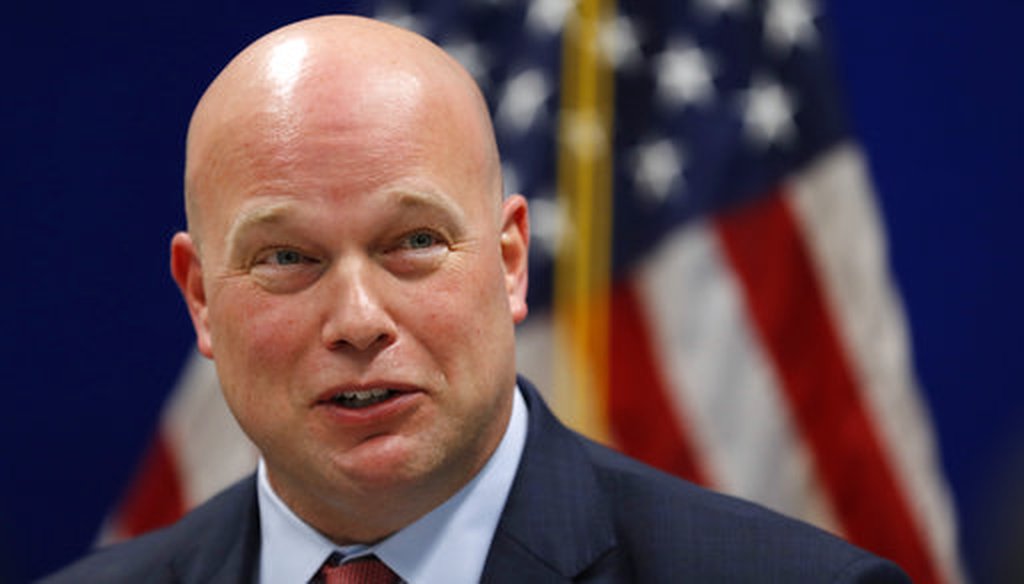Stand up for the facts!
Our only agenda is to publish the truth so you can be an informed participant in democracy.
We need your help.
I would like to contribute

Acting Attorney General Matthew Whitaker speaks to state and local law enforcement officials at the U.S. Attorney's Office for the Southern District of Iowa, Wednesday, Nov. 14, 2018, in Des Moines, Iowa. (AP Photo/Charlie Neibergall)
A day after the midterm elections, President Donald Trump replaced outgoing Attorney General Jeff Sessions with Justice Department lawyer Matthew Whitaker. Critics say Trump acted unlawfully because Whitaker hasn’t received Senate confirmation for the role.
At stake in the dispute over Sessions’ successor is a fight for control of Special Counsel Robert Mueller’s investigation into Russia’s 2016 election meddling and possible collusion with the Trump campaign. As acting attorney general, Whitaker oversees the probe, which he has publicly criticized as overly broad.
Attorneys for the Justice Department argue Whitaker’s appointment is on solid legal ground. But some constitutional experts say Trump unlawfully sidestepped Congress when he elevated Whitaker without Senate confirmation.
As a new lawsuit challenging Trump’s move makes it way through the courts, here’s what you need to know.
Office of Legal Counsel memo
Attorneys in the Justice Department’s Office of Legal Counsel say Trump’s appointment of Whitaker was lawful and doesn’t require Senate confirmation.
In a Nov. 14 memo, department lawyers argued Trump’s move is authorized by two congressional statutes: the Attorney General Succession Act and the Federal Vacancies Reform Act of 1998.
The Justice Department’s legal brief also argues Whitaker’s appointment does not fall under the U.S. Constitution’s Appointments Clause, which obliges the Senate to provide the president advice and consent on certain high-ranking appointments.
Under the Appointments Clause, only "principal officers" require Senate confirmation, while inferior officers do not. Justice Department lawyers argue that because Whitaker’s elevation to acting attorney general is temporary, he does not require vetting by Congress, a position with support from some legal scholars.
"An inferior officer may perform the duties of a principal officer ‘for a limited time and under special and temporary conditions’ without ‘transform(ing)’ his office into one for which Senate confirmation is required," the Office of Legal Counsel memo reads, citing an 1898 Supreme Court decision.
Pushback from scholars
But some constitutional scholars say the 1898 decision, United States vs. Eaton, does not give Trump a sound legal basis to install Whitaker as acting attorney general without Congress’ approval.
The Eaton case involved an ambassadorial post in Siam, now present-day Thailand. After the consul of Siam fell ill, his vice consul, Lewis A. Eaton, a non-Senate-confirmed officer and the only viable substitute, was chosen to replace him.
Given the Siam shakeup occurred prior to airplane travel, it would have taken weeks for a Senate-confirmed officer to arrive.
"Unlike Eaton, the Whitaker appointment was based on the president’s personal preference rather than a state of exigency," said Jens David Ohlin, a professor and vice dean at Cornell Law School. "I disagree with the conclusion that this is constitutional."
"There are plenty of Senate-confirmed possibilities within the Justice Department for Trump to select from," Ohlin added. "This includes Deputy Attorney General Rod Rosenstein, but also plenty of U.S. Attorneys as well."
In a New York Times opinion piece, lawyers Neal Katyal, a former acting solicitor general under President Barack Obama, and George Conway III, a litigator and husband of Kellyanne Conway, counselor to Trump, also made the case that Whitaker’s appointment is unconstitutional.
They argued Whitaker is unquestionably a principal officer because he reports only to the president, thereby obligating Whitaker to receive Senate confirmation, and cited a 2017 concurring opinion by Justice Clarence Thomas as support.
"It means that Mr. Trump’s installation of Matthew Whitaker as acting attorney general of the United States after forcing the resignation of Jeff Sessions is unconstitutional. It’s illegal," Katyal and Conway wrote. "And it means that anything Mr. Whitaker does, or tries to do, in that position is invalid."
Legal challenge
The state of Maryland mounted the first legal challenge of Whitaker’s post in a Nov. 13 filing in federal court.
The lawsuit, which stems from ongoing litigation over the Trump administration’s handling of the Affordable Care Act, asks the court to recognize Rosenstein as the duly-authorized acting attorney general. This would reinstate Rosenstein’s oversight of the Mueller probe.
Maryland argues that the appointment of Whitaker violates both the Appointments Clause and the Attorney General Succession Act.
Some legal experts say it’s an open question as to whether Maryland has standing to make such a request. But they expect the courts will eventually address the dispute, which may ultimately reach the Supreme Court.
"There’s a strong possibility that this will go to the Supreme Court," Ohlin said, assuming Whitaker remains in his post. "This is just the type of issue that the court likes to resolve."
Our Sources
Office of Legal Counsel memo, Nov. 14, 2018
Neal Katyal and George Conway III in the New York Times, "Trump’s Appointment of the Acting Attorney General Is Unconstitutional," Nov. 8, 2018
John Yoo in The Atlantic, "Whitaker’s Appointment Is Unconstitutional," Nov. 13, 2018
Stephen Vladeck in the New York Times, "Whitaker May Be a Bad Choice, but He’s a Legal One," Nov. 9, 2018
State of Maryland v. United States of America, Nov. 13, 2018
Politico, "New acting A.G. criticized Mueller probe several times," Nov. 7, 2018
Interview with John Bies, chief counsel at American Oversight, Nov. 14, 2018
Email interview with Jens David Ohlin, a professor at Cornell Law School, Nov. 14, 2018














































